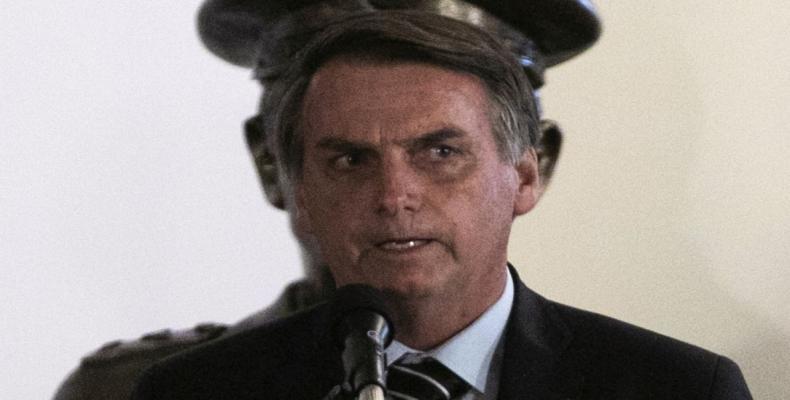Brasilia, August 7 (RHC)-- Thousands of Brazilians protested Monday in Sao Paulo against comments by President Jair Bolsonaro in favor of the brutal military dictatorship that ruled the country between 1964 and 1985.
“We are resistance against the arbitrariness said and committed by Bolsonaro administration," the Landless Workers Movement (MTST) said and added: "With raised fists, we bring to the streets all the disappeared and killed during the dictatorship in Brazil and who fought for democracy!”
The "Dictatorship Never Again" march started at the Paulista Avenue, the Brazilian Wall Street, to reject a military regime which left a number, not yet fully determined, of murders or disappearances.
Supported by the "People Without Fear" movement, protesters displayed photos of the people disappeared during the dictatorship, one of the darkest chapters in the Brazilian history, whose documented brutality has been repeatedly questioned by far-right President Bolsonaro.
Among those missing is Fernando Santa Cruz, father of the president of the Brazilian Bar Association (OAB), whose memory was remembered in the march. Bolsonaro said recently that he knew "the truth" about the whereabouts of Santa Cruz and attributed his death to a leftist group, a baseless claim which contradicts the documents of the country's Truth Commission.
"Today history marched. On a cold Monday, 10,000 homeless militants crossed the city of Sao Paulo and occupied the entrance of the current police station, the former DOI-CODI detention center, where those to whom Bolsonaro pays homage tortured and killed during the military dictatorship."
These statements, which are added to his long list of controversial, unfounded or false statements about the dictatorship, have reopened wounds left within Brazil's society from a period which was marked by repression and torture, activists argued.
"Brazil's president, Bolsonaro, is rescuing a historical discourse which he did not invent, namely, that the Brazilian dictatorship did not exist and that it was soft," Viviana Mendes, a member of the Relatives of the Dead and Missing Politicians Commission, said. "Once again, we need to carry out that struggle. We need to say that the dictatorship did exist, murdered and caused missing persons."
The Truth Commission's report identified 377 agents of the dictatorship as responsible for torture cases; however, they could not be tried because they benefited from a 1979 amnesty. "Brazil did not punish its torturers," said professor Lucas Marcelino, who took to the streets to "rescue memory, truth and justice" and continue fighting to "find the mortal remains of missing politicians and do justice of those who were killed and tortured."
One of the leaders of the dictatorship's repressive apparatus who benefited from the amnesty was Colonel Carlos Brilhante Ustra, whom Bolsonaro defended while he was still a deputy during the political trial that led to the dismissal of Dilma Rousseff, president of Brazil between 2011 and 2016.
In his speech, Bolsonaro referred to Brilhante Ustra as the "dread of Dilma Rousseff," for she was imprisoned and tortured by him due to her relationship with guerrilla groups at the time.
The president's son, Eduardo Bolsonaro, who is considered a likely candidate for Brazil's ambassador to the U.S., doubled down on his father's comments through ironic rhetoric questioning funds granted to the victims of the military regime.
"Until today almost $2.5 billion of taxpayers' money have gone to pay compensations and pensions to political amnesties. It is the 'dictatorship subsidy.' Hence the interest of many to say that they have been harmed by the regime military 1964-1985," Bolsonaro's son tweeted.


